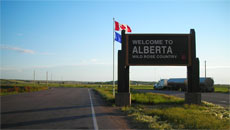VANCOUVER - A new study done in northeastern Alberta suggests habitat restoration may not be enough to save threatened woodland caribou, at least in the short term, and researchers at the University of British Columbia say their results make the case for a more rigorous analysis of conservation methods.
Much of the caribou habitat in Western Canada has already been degraded by industrial activities, such as oil and gas exploration, so one of the key tools being used to protect caribou is habitat restoration, said Cole Burton, the senior author of the study and a forestry professor who leads the wildlife coexistence lab at the university.
But wildlife responses to habitat restoration are often assumed rather than verified, the study says.
"We can't just accept on faith that things are working," Burton said in an interview on Wednesday.
The researchers set out to monitor caribou and their predators, such as black bears and wolves, as well as other prey like moose and white-tailed deer in both restored and unrestored habitat areas between 2015 and 2018.
In northeastern Alberta, they placed hidden cameras along seismic lines — narrow strips of land cleared for oil and gas exploration. They fragment caribou habitat and facilitate the movement of predators, disrupting a natural separation and increasing the predation of caribou, Burton said.
The study, which was published last week in the journal Biological Conservation, showed that most predators and prey used the restored seismic lines about as much as they used the unrestored lines.
Caribou preferred to use more isolated lines and those around low-lying wetland areas, regardless of whether the lines had been restored. Only white-tailed deer were observed using the restored lines less than the unrestored ones, the study found.
The researchers monitored lines that had been restored three to six years before the study as part of an effort by members of the Canadian Oil Sands Innovation Alliance, or COSIA, to reclaim 570 square kilometres of caribou habitat along the Athabasca River about 70 kilometres southwest of Fort McMurray, Alta.
In addition to tree planting, restoration can also include the development of mounds of earth and piles of fallen logs and debris to try to break up the movement and sight lines of predators.
Deterring predators with so-called movement blockers requires substantial effort and modification of the landscape, said Burton, who noted it's possible that intensifying these efforts could help break up seismic lines more effectively.
The lines Burton and his team studied in Alberta were developed around the 1980s.
"Since that time, industry has tried to change their methods to what they would call low-impact seismic lines, so much narrower (and) maybe not as straight, so they break up the line of sight of the predators, like wolves," said Burton.
COSIA could not immediately be reached for comment.
The same issues are happening in northeastern B.C., where woodland caribou also roam alongside seismic lines established for oil and gas exploration, Burton said.
In October, the province announced it was allocating $6.5 million over three years for caribou habitat restoration projects, including planting trees, spreading woody debris and installing fences to disrupt the thoroughfares that advantage predators.
But trees grow back slowly in the northern Boreal forest, which means caribou habitat restoration is a long-term process, Burton said.
A spokesperson for the B.C. Ministry of Forests, Lands, Natural Resource Operations and Rural Development said it is reviewing the study to determine if and how its findings could be applied to the province's caribou recovery strategy. The ministry also said the recovery program is closely monitored to determine whether it's meeting caribou recovery goals.
More immediate measures, such as maternity penning where pregnant caribou are protected by a fence as well as predator culling, are also part of the B.C. government's strategy to protect threatened caribou.
Burton said it's likely the province will have to pursue a predator cull, which is contentious, for a long time until caribou habitat recovers more fully.
"If we're going to keep caribou around, we really do need to think about what vision are we going to keep them in," said Burton.
"Are we going to put them in a little fenced area until we finish developing and restoring the landscape and just hope that they survive? Or are we going to have a vision where we have more substantial protection of their habitat?"


